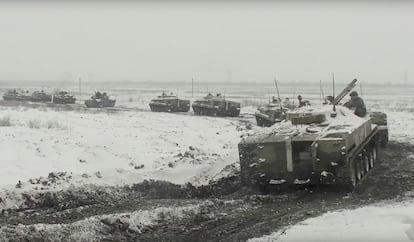US offered disarmament measures to Russia in exchange for deescalation of military threat in Ukraine
In documents accessed by EL PAÍS, the responses from Washington and NATO to Vladimir Putin’s demands reject closing the door on future incorporations to the Alliance but do pave the way for mutual trust-building measures

The United States and NATO reject signing a bilateral agreement on security in Europe with Russia and also closing the door on the future incorporation of Ukraine into the Atlantic Alliance. Those were two of the main demands presented by Moscow to put an end to the crisis in Ukraine at a moment of maximum tension between Russia and the West and that threatened Euro-Atlantic security. By contrast, both Washington and the Alliance offer Putin negotiations on disarmament agreements and trust-building measures in different forums – such as the Organization for Security and Co-operation in Europe (OSCE), the US-Russia Strategic Stability Dialogue, and the NATO-Russia Council – the success of which are conditioned on the start of a deescalation of the Russian military threat to Ukraine. That is according to two confidential documents sent last Wednesday by Washington and NATO to Moscow, and to which EL PAÍS has had access.
“Considering the substantial, unprovoked, unjustified, and ongoing Russian military build-up in and around Ukraine and in Belarus, we call on Russia to immediately de-escalate the situation in a verifiable, timely, and lasting manner,” NATO states. “It is the position of the United States government that progress can only be achieved on these issues in an environment of de-escalation with respect to Russia’s threatening actions towards Ukraine,” warns Washington.
The Russian authorities demanded a written response to their proposal to sign a deal that gave security guarantees to Moscow regarding the expansion of NATO to the east. Moscow even included a draft version of the hypothetical deal. The response was two texts: one titled “Confidential/Rel Russia” (consisting of an introduction, seven points and some brief conclusions) on the part of Washington; and another, under the heading “NATO-Russia Restricted” (with 12 sections), from the Atlantic Alliance. The texts capture to a large extent – albeit in a much more detailed form – the messages that the Western leaders have conveyed in public to the Kremlin. The US and NATO have coordinated their responses, which are complementary but do contain some differences.
The main difference between both texts is that Washington is prepared to discuss the concept of “indivisibility of security,” which the OSCE approved at its summit in Nur-Sultan, Kazakhstan in 2010. Moscow has included this in the first article in its draft deal, using this principle to allege that the eventual entry of Ukraine into NATO would affect its security. The text from the US warns that it does not share the Russian point of view and notes that the concept of indivisibility of security “cannot be viewed in isolation.” Even so, it expresses willingness to deal with the “respective interpretations” of the same. And it points out that “the United States and Russia also reaffirmed the inherent right of each and every participating state to be free to choose or change its security arrangements, including treaties of alliance.”
From the beginning, the document from Washington makes clear that it “continues to firmly support NATO’s Open Door Policy,” and so does not exclude the future incorporation of Ukraine or Georgia into the Alliance. And it clarifies that whatever the case this issue should be dealt with at the NATO-Russia Council (NRC). The NATO text also reinforces its open-door policy and underlines the right of all states to choose their agreements in terms of security “free from outside interference.”
Moscow is yet to send a written reply, but allied sources say that Russia has called on the United States and NATO to unify their responses and for the latter to agree to a discussion of the concept of “indivisibility of security,” as the US has done.

Click here to download the full documents
The US secretary of state, Antony Blinken, and Russian Foreign Minister Sergey Lavrov, yesterday had their first telephone contact since the US and NATO sent its responses to Moscow. Blinken, according to a spokesperson from the State Department, conveyed to Lavrov his willingness to continue with a “substantial” exchange of proposals on security, while his Russian counterpart said that both would accept proceeding with dialogue. “We will see how it goes,” he said to Russian television.
With relation to Ukraine, the Biden administration is offering Russia “conditions-based reciprocal transparency measures” under which Russia and the US would agree to “refrain from deploying offensive ground-launched missile systems and permanent forces with a combat mission in the territory of Ukraine.” For this, Washington announces its proposal to consult with Kyiv.
These mutual trust agreements, together with the disarmament pacts, are the two keys of the texts sent by Washington and the Alliance. The US document begins stating that it is “prepared to work toward reaching an understanding with Russia, along with our Transatlantic Allies and partners, on security issues of interest.” And it lays out a series of issues on which it is “ready to discuss reciprocal commitments or actions” and the fora at which they should be addressed. The US states that it is prepared to deal with this process “in good faith,” while reproaching Putin for having deployed more than 100,000 soldiers on the border with Ukraine, for having occupied the Crimean Peninsula, and encouraging the conflict in Donbas (the eastern region of Ukraine, mostly Russian-speaking).
Washington complains that, in its draft deal on security in Europe, “Russia made certain demands that undermine principles Russia has committed to in prior documents.” “It is imperative”, it continues, “that discussions take place on the basis of the core founding documents on European security”, such as the Helsinki Final Act, the NATO-Russia Founding Act, and the Paris and United Nations charters, “which enshrine the principles of sovereignty, territorial integrity, and every state’s right to choose its security agreements and alliances [...].”
Limit on missiles
A number of US proposals imply limits on missiles that could culminate in new disarmament agreements. Washington has said it is prepared to start bilateral conversations with Russia on the control of short- and medium-range missiles and their launchers, although it criticizes the breaking of the Intermediate-Range Nuclear Forces Treaty with the production and deployment of SSC-8 missiles and other systems. The US government reaffirms its commitment to the New START treaty for intercontinental missiles, which is in force until 2026, but it proposes the inclusion of new launchers, non-strategic arms and undeployed nuclear warheads. What’s more, it suggests beginning “discussions immediately on follow-on measures to New START” and discussing how future deals “would include all US and Russian nuclear weapons.” The document shows the concern of Washington and its allies given the efforts of Russia to diversify and increase its nuclear arsenal, develop new intercontinental missiles and deploy dual and non-strategic missiles near NATO borders.
One of the most novel proposals is the offer to Russia of a “transparency mechanism” to verify the absence of Tomahawk cruise missiles, which are capable of reaching Russian territory, at the NATO anti-missile shield bases in Romania and Bulgaria, and which house the Aegis system. In return, Washington calls for an identical approach with two missile-launching bases of its choice in Russian territory. Moscow had proposed limiting the deployment of short- and long-range missiles and expressed its concern for the fact that the anti-missile shield bases in Romania and Bulgaria could house Tomahawk missiles.
Given the unease of the European Union over its exclusion from these negotiations, the United States guarantees that it will discuss all of the issues that affect the security of Europe with its allies.
Tu suscripción se está usando en otro dispositivo
¿Quieres añadir otro usuario a tu suscripción?
Si continúas leyendo en este dispositivo, no se podrá leer en el otro.
FlechaTu suscripción se está usando en otro dispositivo y solo puedes acceder a EL PAÍS desde un dispositivo a la vez.
Si quieres compartir tu cuenta, cambia tu suscripción a la modalidad Premium, así podrás añadir otro usuario. Cada uno accederá con su propia cuenta de email, lo que os permitirá personalizar vuestra experiencia en EL PAÍS.
¿Tienes una suscripción de empresa? Accede aquí para contratar más cuentas.
En el caso de no saber quién está usando tu cuenta, te recomendamos cambiar tu contraseña aquí.
Si decides continuar compartiendo tu cuenta, este mensaje se mostrará en tu dispositivo y en el de la otra persona que está usando tu cuenta de forma indefinida, afectando a tu experiencia de lectura. Puedes consultar aquí los términos y condiciones de la suscripción digital.








































